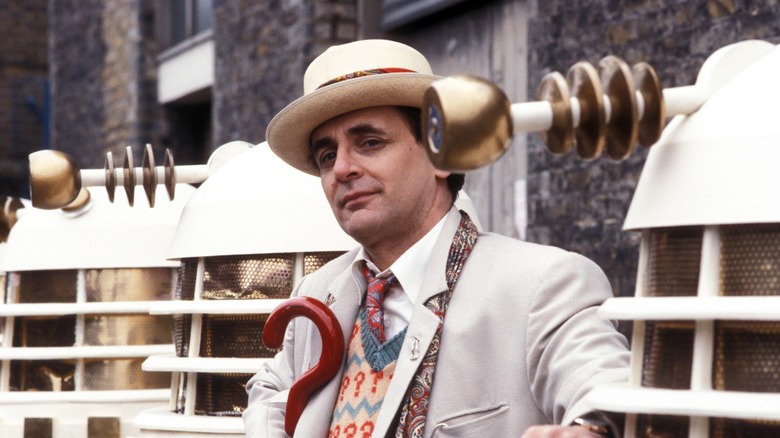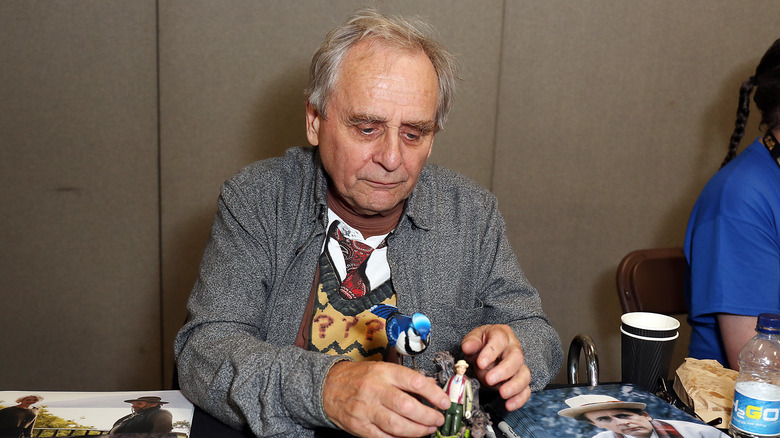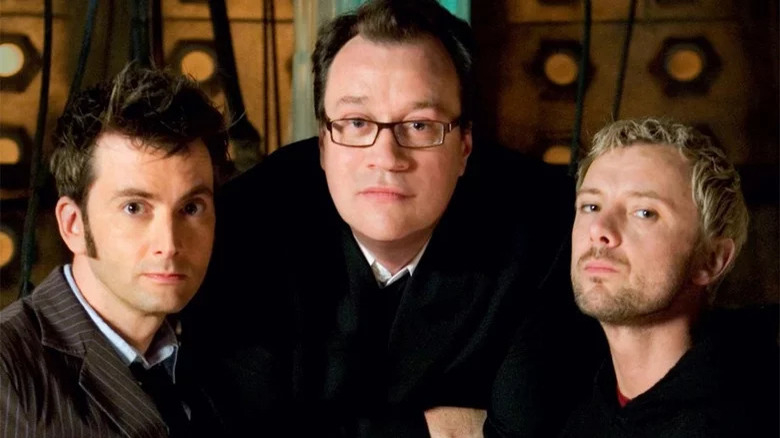Why Doctor Who Went On A 15-Year Hiatus After Sylvester McCoy's Exit
Even before its revival in 2005, "Doctor Who" was a show well-known for its longevity. Thanks to its inspired concept of regeneration, the show could have its main character be played by a brand new person whenever things threatened to feel stale. As the success of Patrick Troughton's second Doctor made it clear, the show's ratings were not based on any one specific person, allowing the original run of "Doctor Who" to go on for 26 seasons, spanning seven different actors for the Doctor and countless more companions.
Although a 26-year run is certainly something to be proud of, the show's cancellation came a little too soon for Sylvester McCoy's taste. The seventh actor for the Doctor argued that "it was a mistake" to have canceled the show just three seasons into his run as the Seventh Doctor, as it was still profitable and the writing for his Doctor was strong. "The last season, many people agreed, the writing and the stories were really good and they were working really well," said McCoy.
'It was internal politics, really'
Originally McCoy had been asked to return for a fourth season and had said yes, only to find out a few months later that BBC would be canceling the show. Rubbing salt in the wound was the fact that the decision didn't seem to be any reflection on the show's quality.
"I was annoyed," McCoy explained, "because they had kind of twisted my arm to do a full season."
While Colin Baker's tenure as the Sixth Doctor was unpopular, most fans agree that Sylvester's portrayal of the Seventh Doctor (as well as the quality of the stories he got to perform in) was a marked improvement. Even though the ratings were no longer at the height of fourth Doctor Tom Baker's era, they were still decent enough to justify the show's continuation. McCoy attributed the decision to internal network politics:
'What happened was the BBC in those days, you could only make your name if you came along with a new program and of course the late Verity Ann Lambert OBE had made her name with Doctor Who 20-odd years before, so the new people wanted to get that [time] slot so they could make something new and make a name for themselves. That's why they got rid of it.'
Although this is certainly part of why the show got axed, the reasons behind the cancellation were a little more complicated than what McCoy got into. Most of it comes down to Michael Grade, who became the controller of BBC One in 1984 and used his position to undermine the show at every step.
'I thought it was rubbish'
Michael Grade took over BBC One just as Colin Baker's Sixth Doctor was taking over. Baker had great plans for the role, and had planned to start the character off as cold and grouchy and then gradually reveal his softer, kinder nature over the course of several seasons. It's a type of character arc Peter Capaldi would later get to pull off as the Twelfth Doctor, but Baker's ambitions were thwarted by the BBC's constant interference.
Grade, who criticized the show for its low production values, decided to cut the show's funds even further. He also repeatedly interfered with the show's production schedule, changing the episode-length from a 25-minute run time to a 45-minute run time. Grade managed to put the show on an 18-month hiatus in 1985, but the massive backlash from fans, fueled by the national tabloids that supported the show, managed to keep the show alive for a couple more years. When "Doctor Who" returned to television, Grade had changed the run times again, bringing the show back to its original 25-minute length but cutting the total number of episodes in half.
Sharing Grade's dislike of the show was the BBC's Head of Drama Jonathon Powell, who would give the scripts harsh, sometimes contradictory feedback that the writers didn't have much time to address before filming. Both Powell and Grade decided that Baker had to be replaced, and in 1986 the actor was fired from the show before his intended character arc could be concluded. Powell would take over Grade's position in 1987, and oversaw the show's cancellation in 1989.
The constant behind-the-scenes meddling, the questionable writing, and the unsatisfying departure of Colin Baker strained the audience's patience for the show. Sylvester McCoy began his run as the Doctor in the unenviable position of starring in a show whose best days were clearly behind it. Although McCoy's run is seen as a definite improvement by fans, it wasn't enough to undo the damage dealt by the chaotic Colin Baker years.
Will the revival suffer the same fate?
Luckily for fans of the revival, the heads of BBC don't seem to have nearly the same contempt for "Doctor Who" as they did back in the '80s. However, just as audience fatigue in the Colin Baker years made it easier for Grade and Powell to interfere with the show, the disappointment of the Chibnall era of the revival could lead to a similar environment.
Although the first 10 seasons of "Doctor Who" were fairly consistent in audience reception, the last few seasons have been met with mixed reviews. The average IMDb ratings for each season stayed around eight out of 10 throughout the tenures of showrunners Russell T. Davies and Steven Moffat, but plummeted to a below-six average in Chris Chibnall's first season, and never recovered. Jodie Whittaker's fine performance as the latest Doctor has been largely undermined by the scripts she's been given.
The return of Davies as the showrunner for season 14 gives fans hope, as we already know from his past tenure that he's more than capable of the job. However, there's something a little disappointing about seeing the show return to a past showrunner rather than move on to someone new. "Doctor Who" has always been a show about change, always moving forward in fresh, exciting directions. Returning to a previous showrunner feels like a step back, and doesn't inspire a lot of confidence in the show's ability to continuously evolve. Although the BBC displays no signs of planning to end the show any time soon, it's hard not to feel that, like with the post-Tom Baker period of the original "Doctor Who" run, the revival series is now clearly past its prime.



